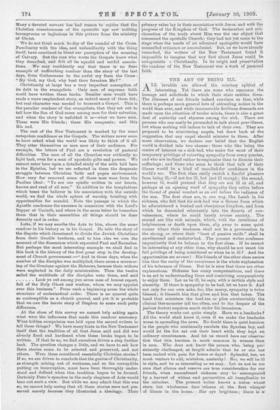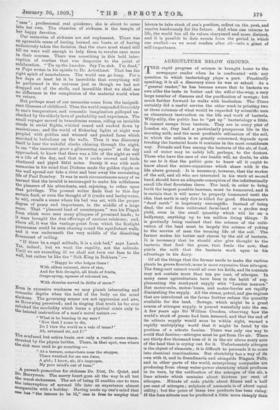THE ART OP BEING ILL.
ALL 'invalids arc allowed the courtesy epithet of interesting. Yet there. are some who renounce the homage and solicitude to which their state entitles them. The illnesses of our friends indeed convince us that, while there is perhaps more general love of attracting notice in the world than ever, and while innumerable fictitious demands are made upon the attention of tender minds, there is also a great deal of austerity and shyness among the sick. There are persons who can easily be persuaded to talk about your illness, but whom nothing will induce to talk of their own. They are prepared to be ministering angels, but draw back at the suggestion that any angel should minister to them. After some observation, we declare our belief that the English world is divided into two classes : those who like being the centre of interest on a sick-bed, who make the most of their temporary privilege of extorting sympathy from every quarter, and who are inclined rather to emphasise than to dismiss their sufferings ; and those who seem to think that talk of their illness would be a kind of uncalled-for confidence in the world's ear. The first class really snatch a fearful pleasure from being ill,—if not .too ill, but just ill enough ; the second, however ill, would pretend that they are not ill at all, and perhaps at an opening word of sympathy they retire before the threat of genial comfert as an owl before the radiance of the sun. The first class are, in one way, like Lamb in his sickness, who felt that his sick-bed was a throne from which he administered a hushed and obsequious kingdom, and from which he descended reluctantly into the deserts of con- valescence, where he could barely arouse anxiety. The second are like sick animals, which, with the intuitions of helplessness or death upon them, slip away to some quiet corner where their weakness shall not be a provocation to the strong, or where their "bout of passive strife" shall be unwitnessed and undisturbed. . The present writer confesses impenitently that he belongs to the first class. If be cannot be interesting at any other time, why should be not exact his full privilege of being considered so when he is ill P And the opportunities are so rare I His friends of the other class assure him that the rarity of the occurrence is the whole explanation of his tolerance of illness. But he is sure that there are other explanations. Sickness has many compensations, and there is an art in understanding these and contriving comparatively to enjoy them. Let us be ill, he says, with a certain style and sincerity. If there is sympathy to be had, let us have it. And not only for our own sake, for, like mercy, sympathy is twice blessed ; it bleaseth him that gives and him that takes. The band that ministers the beef-tea or plies amateurishly the clinical thermometer (all too often, and to the despair of the jealous dootor) acquires merit under his incentives.
The theory works out quite simply. Have we a headache P All the world shall know it, even if we make the headache worse in spreading the news. No doubt there is quiet heroism in the people who continually emulate the Spartan boy, and would let the fox eat out their heart while they kept an ordinary countenance. And let us record here our observa- tion that this heroism is more common in women than in men. Who does not know the person who, being per- sistently challenged, at length admits that he or she has been racked with pain for hours or days P Splendid, but, we must venture to add, mistaken, austerity! No; we will be ill in style, and be as interesting as we may. Let us not be too sure that silence and reserve are true consideration for our friends, when nnoonfessed sickness may be • accompanied by a harvest of whims and perversities all inexplicable to the onlooker. The present writer knows a nurse whose'
stern but wholesome face relaxes at the first whisper., of illness in the house. Her eye brightens ; there is a' "Case", professional zeal quickens ; she is about to come into her own. The chamber of sickness is the temple of her happy devotion.
Our memories of sickness are not unpleasant. There was an agreeable sense of having burned our boats, or of having audaciously taken the decision that the stars must stand still till we were well enough to help them to revolve once more in their courses. There was something in this bold inter- ruption of routine that was desperate to the point of exhilaration. " Tie up the knocker. Say I'm sick. I'm dead," as Pope writes in his epistle to Dr. Arbuthnot. That has the right spirit of nonchalance. The world can go bang. For a few days at least let it be incredible that everything will be performed in the universe just as though we had not dropped out of the strife, and incredible that we shall see no difference in the complexion of the material world when we return.
But perhaps most of our memories come from the insignifi- cant illnesses of childhood. Then the world responded feverishly to one's temperature, and romantic imagination galloped un- checked by the elderly laws of probability and experience. The Small voyager moved in tumultuous scenes, riding on invisible steeds in aerial flights, whirled round and sucked down by maelstroms; and the world of flickering lights at night was Peopled with goblins and wizened and peaked faces which marched in battalions on the walls. Then it was discovery itself to hear the wakeful clocks, chiming through the night, to see "the casement grow a glimmering square" as the day approached, to know that there was a life of the night as well as a life of the day, and that in it cocks crowed and birds chattered and piped fitful notes. Surely it was with such Memories in his mind that Dickens made the golden ripple on the wall spread out into a river and bear away the unresisting life of Paul Dombey. It was in such circumstances many of us learned that the invalid is endouraged to make his selfishness the pleasure of his attendants, and, rejoicing, to refine upon that privilege. The present writer finds that to this day eertain food, or even the thought of it (rusks and barleywater, to wit), recalls a scene where his bed was set, with the proper degree of pomp and importance, in the middle of a large room. That "pleasant land of counterpane" was his Pisgah from which were seen many glimpses of promised lands ; to it were brought the due offerings of anxious relations ; and, above all, it was the vantage-point from which the firelight panoramas could be seen chasing round the equidistant walls, and it was underneath the very middle of the dissolving firmament of ceiling.
"If there be a regal solitude, it is a sick-bed," says Lamb. Tea, indeed; but we want the regality, not the solitude. Until we are exceeding ill we shall not turn our face to the 'all, but rather be like the "Sick King in 13okhara":— "Happy he who lodges there I With silken raiment, store of rice, And for this drought, all kinds of fruits, Grape-syrup, squares of coloured ice, With cherries served in drifts of snow."
Even in excessive weakness we may plumb interesting and romantic depths when the hold of the body on the mind Slackens. The governing senses are not oppression and awe, as Browning perceived; and in singing that truth he for ever rebuked the morbidity which turns a physical crisis only to the belated instruction of a man's moral nature :— "What is he buzzing in my ears ?
'Now that I come to die,
Do I view the world as a vale of tears?'
Ah, reverend sir, not II" The confused but active brain saw only a rustic scene recon- atruoted by the physic bottles. There, in that spot, was where tlaa sick man used to go courting :— " At a terrace, somewhere near the stopper,
There watched for me one June, A girl; I know, sir, it's improper, My poor mind's out of tune."
A. proverb prescribes for sickness Dr. Diet, Dr. Quiet, and Br. Merryman. The merry heart goes all the way hi all but the worst sicknesses. The art of being ill enables one to turn the interruption of normal life into an experience almost eomparable with a holiday. Having made up one's mind that One has "the leisure to be ill," one is free to employ that leisure to take stock Of one's position, refieot on the peek and resolve handsomely for the future. And when one returns to life, the world has all its values sharpened and more distinct, and it is possible to date events from the period in which one swelled—as we must confess after all—into a giant of self-importance.

























































 Previous page
Previous page